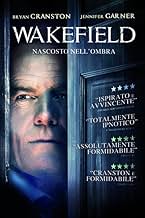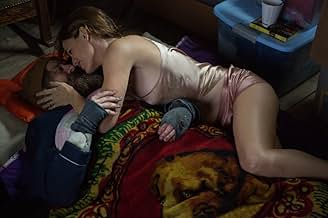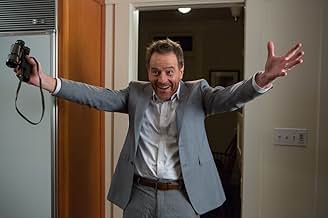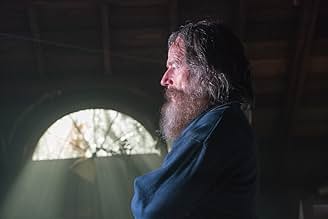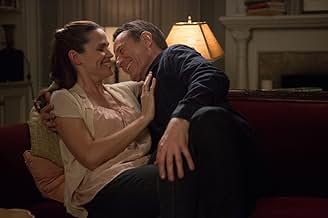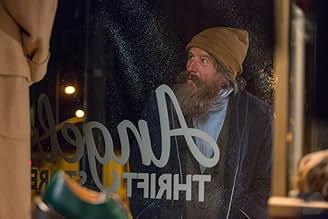Wakefield
- 2016
- Tous publics
- 1h 46m
IMDb RATING
6.3/10
19K
YOUR RATING
A lawyer on the edge of madness decides to disassociate himself from his own life.A lawyer on the edge of madness decides to disassociate himself from his own life.A lawyer on the edge of madness decides to disassociate himself from his own life.
- Awards
- 1 win & 1 nomination total
Derek Alvarado
- Male Police Officer
- (as Derek Weston)
Michael Balin
- Cop
- (uncredited)
- Director
- Writers
- All cast & crew
- Production, box office & more at IMDbPro
Featured review
Greetings again from the darkness. Oscar nominated for her screenplay to The Curious Case of Benjamin Button (2008), Robin Swicord's directorial debut of The Jane Austen Book Club (2007) was not particularly impressive. However, she bounces back nicely with this Bryan Cranston vehicle and one of the more creative scripts featuring internal dialogue that's ever hit the silver screen. Cranston is showing a knack for selecting interesting projects, and he excels here as the high-powered attorney who spontaneously decides to drop out of society in a most unusual manner.
There is a ton of social commentary on display here with targets including married life, suburban living, career pressures, and self-doubt substantially summed up with a line from Cranston's character, "Most everyone has had the impulse to put their life on hold." As he proceeds through his new 'unshackled' and 'primal' lifestyle while observing the world unnoticed through the small window in his garage attic, much of his focus seems to be on discovering just who he is at his core, and what is the truth behind his relationship with his wife (Jennifer Garner). It's as if he is asking "What am I?" while clinging to his previous life in a voyeuristic way.
Ms. Swicord's screenplay is adapted from E.L. Doctorow's short story and it's sneaky in the way that it questions how we go about our daily life, and how one can "snap" emotionally if feeling unappreciated. It's a showcase for the other side of upper middle class white privilege, as well as suburban alienation that is so prevalent (and ignored) today. By dropping out but staying close, Cranston's character actually pays more attention to his family than he usually would if sitting next to them at the dinner table.
We are accustomed to a mid-life crisis involving a sports car, marital affair or sudden career change. It's highly unusual for someone to actually "disappear". It's at that point where the narration really shines it's insightful, observational and thought-provoking. Beyond that, the comedic edge is laden with sadness. The story humanizes this pretty despicable guy – or at least a guy who does a pretty despicable thing. The score is in the style of a 1980's Brian DePalma movie, which just adds to the unique cinematic experience. This is one to see for Cranston's performance, as well as for Ms. Swicord's commentary on today's way of life.
There is a ton of social commentary on display here with targets including married life, suburban living, career pressures, and self-doubt substantially summed up with a line from Cranston's character, "Most everyone has had the impulse to put their life on hold." As he proceeds through his new 'unshackled' and 'primal' lifestyle while observing the world unnoticed through the small window in his garage attic, much of his focus seems to be on discovering just who he is at his core, and what is the truth behind his relationship with his wife (Jennifer Garner). It's as if he is asking "What am I?" while clinging to his previous life in a voyeuristic way.
Ms. Swicord's screenplay is adapted from E.L. Doctorow's short story and it's sneaky in the way that it questions how we go about our daily life, and how one can "snap" emotionally if feeling unappreciated. It's a showcase for the other side of upper middle class white privilege, as well as suburban alienation that is so prevalent (and ignored) today. By dropping out but staying close, Cranston's character actually pays more attention to his family than he usually would if sitting next to them at the dinner table.
We are accustomed to a mid-life crisis involving a sports car, marital affair or sudden career change. It's highly unusual for someone to actually "disappear". It's at that point where the narration really shines it's insightful, observational and thought-provoking. Beyond that, the comedic edge is laden with sadness. The story humanizes this pretty despicable guy – or at least a guy who does a pretty despicable thing. The score is in the style of a 1980's Brian DePalma movie, which just adds to the unique cinematic experience. This is one to see for Cranston's performance, as well as for Ms. Swicord's commentary on today's way of life.
- ferguson-6
- May 16, 2017
- Permalink
Storyline
Did you know
- TriviaFilmed in 20 days.
- GoofsThe train Wakefield boarded from Grand Central was a diesel hauled train. A power outage might have affected the train's motion (electric trains stalled ahead etc), but it would not have affected the lights in the train given that the power comes from the diesel locomotive.
- Quotes
Howard Wakefield: People will say that I left my wife and I suppose, as a factual matter, I did, but where was the intentionality? I had no thought of deserting her.
- How long is Wakefield?Powered by Alexa
Details
- Release date
- Country of origin
- Official site
- Language
- Also known as
- У всьому винен єнот
- Filming locations
- Production companies
- See more company credits at IMDbPro
Box office
- Gross US & Canada
- $262,599
- Opening weekend US & Canada
- $11,299
- May 21, 2017
- Gross worldwide
- $798,214
- Runtime1 hour 46 minutes
- Color
- Aspect ratio
- 2.35 : 1
Contribute to this page
Suggest an edit or add missing content

























